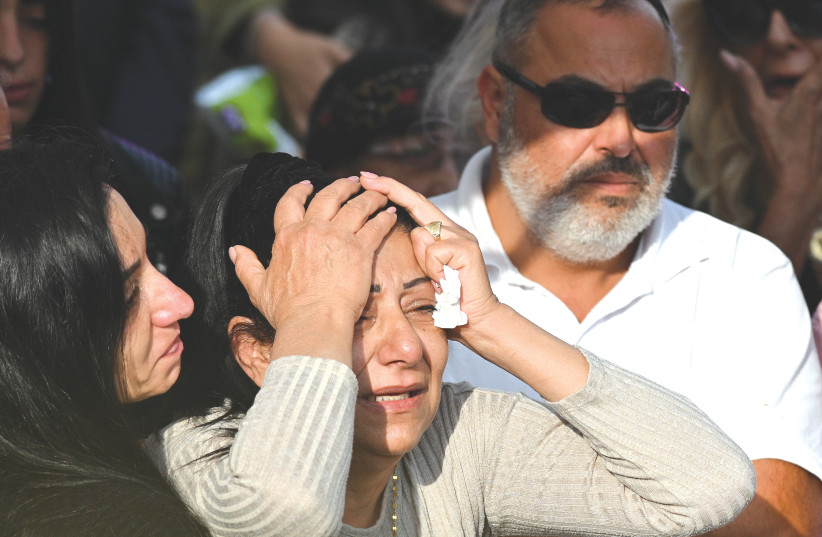The Defense Ministry on Wednesday said 7,209 soldiers have been wounded during the current war, and 2,111 of them, or 29%, are suffering specific emotional harm.
For 1,227 of those with emotional harm, or 60%, their emotional problems are their primary problem.
Prior to the war, there were about 62,000 wounded soldiers from all prior wars and battles, including about 11,000, or 18%, who had emotional harm. About 8,000 of those 11,000, or 70%, experienced emotional symptoms as their primary problem.
While post-traumatic stress disorder (PTSD) is the main diagnosis for those with emotional problems, Defense Ministry officials said they recognize and assist a variety of emotional disorders.

The ministry said it projects that by the end of 2024, about 20,000 more soldiers will be wounded during the year, and some 8,000, or 40%, will experience emotional harm.
Ninety-five percent of the 7,209 wounded soldiers are male reservists under the age of 30, the Defense Ministry said.
Questioned about why the percentage of emotional harm and PTSD is so much higher from the current war compared with prior wars, ministry officials said the ministry’s approach is more liberal and engaging on such issues now than in the past.
Although ministry officials did not refer to politics, it has been clear from the attention top political officials have given the issue that the war cabinet is far more concerned about being exposed to political criticism for failing to address disabled veterans’ concerns now than they have been in the past.
War cabinet concerned over criticism for failing to address PTSD among veterans
Although ministry officials did not refer to politics, it has been clear from the attention top political officials have given the issue that the war cabinet is far more concerned about being exposed to political criticism for failing to address disabled veterans’ concerns now than they have been in the past.
Some of this is because the length of the war, more than six months, has dwarfed past wars. The longest recent prior war was in 2015 and lasted less than two months. The only war that lasted longer was the War of Independence in 1948.
In addition, after decades of very little service, the country’s full reservist corps was called up, impacting hundreds of thousands of soldiers who were taken away from the economy and their families.
Adding in the families of those reservists, the likely impact as a constituency could easily be over one million voters, something that no politician can ignore.
Moreover, with over 1,500 dead Israelis and 7,209 wounded soldiers so far, the volume of harmed soldiers also dwarfs prior recent wars.
To address the various issues, Limor Loria, head of the Defense Ministry’s Rehabilitation Division, said committees that previously were a bar to recognition and funding for rehabilitation, both physical and mental, have been frozen for at least a year.
About 90% of the recognition and funding process takes place almost immediately for most IDF veterans who approach the ministry, while some 70% of wounded veterans have gotten more formal recognition, even if at some later date they may also need to be processed through the standard committee apparatus, she said.
Until the war, despite a push by IDF medical officers, a mix of the Defense and Finance ministries had been accused of extreme bureaucracy that was keeping wounded soldiers from receiving benefits, with the worst treatment being reserved for those seeking emotional support for PTSD and other conditions.
The Knesset had failed to pass a formal law to address all of the relevant issues, Loria said, adding that at least for now, the ministry was being allowed to dole out funds as needed as part of the war’s emergency situation.
Another Defense Ministry official, Noa Rofe, said the ministry was kicking into high gear to offer services with the approach of Pessah, which she said often unfortunately led to a spike in problems and even potential suicides.
Rofe said there was a variety of special services for PTSD and other conditions, with two different emergency phone lines to call, including *8944.
Sheba Medical Center in Tel Hashomer opened a special center for receiving wounded veterans with PTSD and other emotional issues earlier this year. It enables the soldiers to be around people with similar unique issues and receive a more tailored treatment process, so that they do not need to fade into the general public.
So far, 102 PTSD patients have received treatment at special safe houses, 243 have received care at houses for achieving balance, 400 have received treatment in outdoor settings, 155 have received special dog companions, and 3,000 others have received various alternative therapies, the Defense Ministry said.
Questioned about soldier survivors of the Supernova music festival on October 7, Loria said as far as she knew, they were still part of the IDF and its care system.
The ministry only became involved with soldiers who have been released to civilian life, she said.
As of February 14, there were 5,500 wounded soldiers from the war, a rate of 43 per day.
The number is probably lower given that there was a large number of wounded soldiers on October 7. With about 1,700 wounded soldiers over the past three plus months, this means the rate of wounded soldiers per day has dropped to 18 per day as the war has slowed in Gaza.
